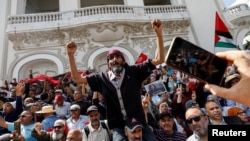President Kais Saied has blocked the Tunisian parliament with tanks, then suspended the constitution and dissolved the Supreme Judicial Council. Saied has also now seized control of the independent electoral commission, allowing him to consolidate his power grip.
Now Saied is preparing to organize a referendum on July 25 on a constitution to be written by a committee of five or six people, appointed solely by the president, with no voice for opposition political parties.
Carnegie Endowment for International Peace Senior Fellow Sarah Yerkes has doubts about the intended pressure behind the United States' decision in March to cut economic and military aid by nearly half.
“If the US decides we're going to fully suspend military aid or even partially suspend aid," Yerkes said, "Russia could fill in that gap very easily.” She added “That would take away the US leverage they have with the Tunisian military.”
On the economic side, Saied has been negotiating with the International Monetary Fund over a multibillion-dollar bailout that would save Tunisia from a looming default.
Shadi Hamid, a senior fellow at the Brookings Institution’s Center for Middle East Policy believes that this affords an opportunity for diplomatic leverage on Tunis.
“The US and its European partners are the largest shareholders in the IMF; and they can use their voting rights to compel IMF officials to suspend talks.”
Instead of pressure, Larry Diamond, Director of Stanford University's Center on Democracy and Rule of Law suggests using incentives and sanctions to convince the Tunisian president that restoring democracy is better for him and for the country.
“I would send a high level US envoy. If that person could be accompanied by someone from the EU, even better," he said. "But I think we should lay out to Saied everything we're willing to do to help and elevate Tunisia and make him a successful president for the remainder of his term.”






